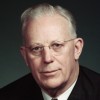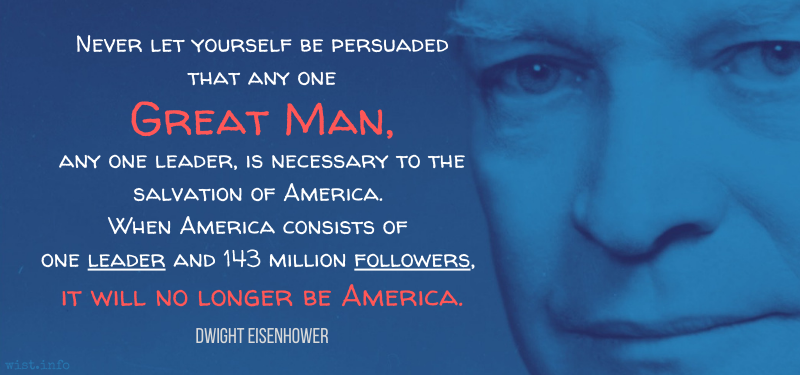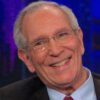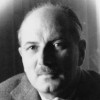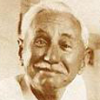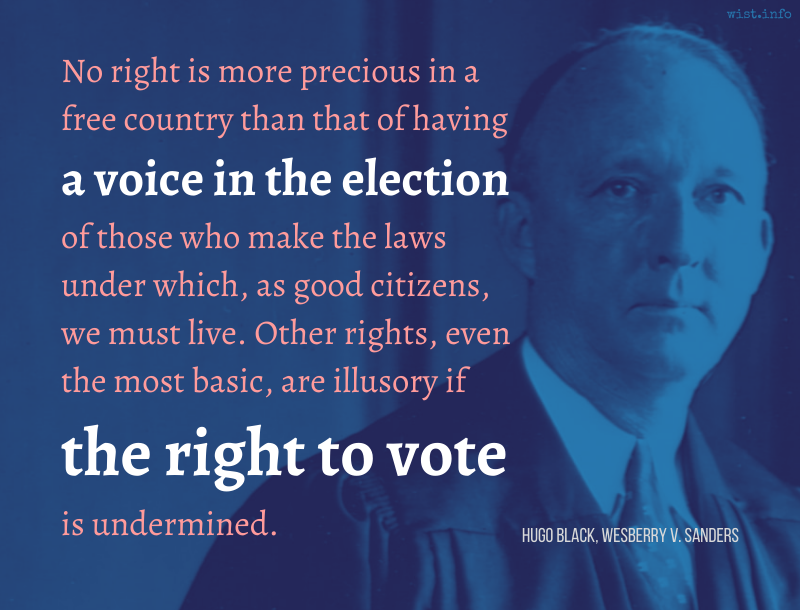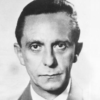Democracy is the theory that two thieves will steal less than one, and three less than two, and four less than three, and so on ad infinitum.
H. L. Mencken (1880-1956) American writer and journalist [Henry Lewis Mencken]
A Little Book in C Major, ch. 5, § 25 (1916)
(Source)
Variant:
DEMOCRACY. The theory that two thieves will steal less than one, and three less than two, and four less than three, and so on ad infinitum.
A Book of Burlesques, "The Jazz Webster" (1924)
Quotations about:
democracy
Note not all quotations have been tagged, so Search may find additional quotes on this topic.
I do not think military readiness, in itself, will defeat Communism. I do not think we can consider the job finished with that. I think it buys us time to do the bigger job. We must demonstrate that it is possible to overcome poverty, misery and decay by democratic means, and that we must ourselves believe, and must show others, that our American tradition of the dignity and liberty of the individual is not a luxury for easy times but is the basic source of strength and security of a successful society.
Jane Jacobs (1916-2006) American-Canadian journalist, author, urban theorist, activist
“No Virtue in Meek Conformity” (1952)
(Source)
Foreword to her response to a State Department Loyalty Security Board interrogatory (1952-03-25). Reprinted in Vital Little Plans (2016).
And so when I hear so much impatient and irritable complaint, so much readiness to replace what we have by guardians for us all, those supermen, evoked somewhere from the clouds, whom none have seen and none are ready to name, I lapse into a dream, as it were. I see children playing on the grass; their voices are shrill and discordant as children’s are; they are restive and quarrelsome; they cannot agree to any common plan; their play annoys them; it goes poorly. And one says, let us make Jack the master; Jack knows all about it; Jack will tell us what each is to do and we shall all agree. But Jack is like all the rest; Helen is discontented with her part and Henry with his, and soon they fall again into their old state. No, the children must learn to play by themselves; there is no Jack the master. And in the end slowly and with infinite disappointment they do learn a little; they learn to forbear, to reckon with anther, accept a little where they wanted much, to live and let live, to yield when they must yield; perhaps, we may hope, not to take all they can. But the condition is that they shall be willing at least to listen to one another, to get the habit of pooling their wishes. Somehow or other they must do this, if the play is to go on; maybe it will not, but there is no Jack, in or out of the box, who can come to straighten the game.
Learned Hand (1872-1961) American jurist
“Democracy: Its Presumptions and Realities,” speech, Federal Bar Association, Washington, DC (1932-03-08)
(Source)
Collected in The Spirit of Liberty (1953).
A democracy is a means whereby we channel our contempt for our fellow man into a lively scorn for those elected to represent him.
Stephen Fry (b. 1957) British actor, writer, comedian
“Trefusis on Any Questions,” Loose Ends, BBC Radio 4 (c. 1987)
(Source)
Reprinted in Paperweight (1992)
Well, you know how Congress is. They’ll vote for anything if the thing they vote for will turn around and vote for them.
One of the evils of democracy is you have to put up with the man you elect whether you want him or not.
Undoubtedly, the right of suffrage is a fundamental in a free and democratic society. Especially since the right to exercise the franchise in a free and unimpaired manner is preservative of other basic civil and political rights, any alleged infringement of the right of citizens to vote must be carefully and meticulously scrutinized.
Earl Warren (1891-1974) American jurist and politician; Chief Justice of the Supreme Court (1953-69)
Reynolds v. Sims, 377 U.S. 533, 561-562 (1964) [majority opinion]
(Source)
Never let yourself be persuaded that any one Great Man, any one leader, is necessary to the salvation of America. When America consists of one leader and 143,000,000 followers, it will no longer be America. Truly American leadership is not of any one man. It is of multitudes of men — and women.
Dwight David Eisenhower (1890-1969) American general, US President (1953-61)
“An Open Letter to America’s Students,” Reader’s Digest (1948-10)
(Source)
Quoted in different locations with various numbers for the US population. The letter was written while Eisenhower was President of Columbia University.
This is supposed to be a participatory democracy and if we’re not in there participating then the people that will manipulate and exploit the system will step in there. So I’ve been a political activist all my life and I think in a large measure it’s because of the internment that we experienced fifty years ago.
George Takei (b. 1937) American actor, author, activist [ジョージ・タケイ, b. Hosato Takei]
Interview by Peter Anthony Holder, CJAD, Montreal (21 Nov 1994)
(Source)
Democracy has no place for the kind of justice implied in an eye for an eye and a tooth for a tooth. Democracy is a system for the resolution of conflict, not for vengeance. Simple black-white notions of right and wrong do not fit into democratic politics. Political controversies result from the fact that the issues are complex, and men may properly have differences of opinion about them. The most terrible of all over-simplifications is the notion that politics is a contest between good people and bad people.
E. E. Schattschneider (1892-1971) American political scientist [Elmer Eric Schattschneider]
Two Hundred Million Americans in Search of a Government (1969)
(Source)
Democracy is based on a profound insight into human nature, the realization that all men are sinful, all are imperfect, all are prejudiced, and none knows the whole truth. That is why we need liberty and why we have an obligation to hear all men. Liberty gives us a chance to learn from other people, to become aware of our own limitations, and to correct our bias. Even when we disagree with other people we like to think that they speak from good motives, and while we realize that all men are limited, we do not let ourselves imagine that any man is bad. Democracy is a political system for people who are not sure that they are right.
E. E. Schattschneider (1892-1971) American political scientist [Elmer Eric Schattschneider]
Two Hundred Million Americans in Search of a Government (1969)
(Source)
When citizens are relatively equal, politics has tended to be fairly democratic. When a few individuals hold enormous amounts of wealth, democracy suffers. The reason for this pattern is simple. Through campaign contributions, lobbying, influence over public discourse, and other means, wealth can be translated into political power. When wealth is highly concentrated — that is, when a few individuals have enormous amounts of money — political power tends to be highly concentrated, too. The wealthy few tend to rule. Average citizens lose political power. Democracy declines.
Benjamin I. Page (b. 1940) American political scientist, academic, researcher
Democracy in America?: What Has Gone Wrong and What We Can Do About It, Part 1, ch. 2 (2017) [with Martin Gilens]
(Source)
Authority has always attracted the lowest elements in the human race. All through history mankind has been bullied by scum. Those who lord it over their fellows and toss commands in every direction and would boss the grass in the meadows about which way to bend in the wind are the most depraved kind of prostitutes. They will submit to any indignity, perform any vile act, do anything to achieve power. The worst off-sloughings of the planet are the ingredients of sovereignty. Every government is a parliament of whores.
The trouble is, in a democracy, the whores are us.
P. J. O'Rourke (b. 1947) American humorist, editor
Parliament of Whores, “At Home in the Parliament of Whores” (1991)
(Source)
Concluding words of the book.
The United States has a system of taxation by confession. That a people so numerous, scattered and individualistic annually assesses itself with a tax liability, often in highly burdensome amounts, is a reassuring sign of the stability and vitality of our system of self-government. What surprised me in once trying to help administer these laws was not to discover examples of recalcitrance, fraud or self-serving mistakes in reporting, but to discover that such derelictions were so few.
Robert H. Jackson (1892-1954) US Supreme Court Justice (1941-54), lawyer, jurist, politician
United States v. Kahriger, 345 U.S. 36 (1953) [concurring]
(Source)
This is often misattributed to Hugo Black, who wrote a dissent in the case.
The biggest threat to our democracy is indifference. The biggest threat to our democracy is cynicism — a cynicism that’s led too many people to turn away from politics and stay home on election day. […] So if you don’t like what’s going on right now — and you shouldn’t — do not complain. Don’t hashtag. Don’t get anxious. Don’t retreat. Don’t binge on whatever it is you’re bingeing on. Don’t lose yourself in ironic detachment. Don’t put your head in the sand. Don’t boo. Vote. You’ve got to vote.
Barack Obama (b. 1961) American politician, US President (2009-2017)
Speech, University of Illinois (7 Sep 2018)
(Source)
Our democracy is not the buildings, not the monuments. It’s you being willing to work to make things better and being willing to listen to each other and argue with each other and come together and knock on doors and make phone calls and treat people with respect.
Barack Obama (b. 1961) American politician, US President (2009-2017)
Staff Farewell, Joint Base Andrews, Maryland (20 Jan 2017)
(Source)
When words stop meaning anything, when truth doesn’t matter, when people can just lie with abandon, democracy can’t work.
Barack Obama (b. 1961) American politician, US President (2009-2017)
Speech, Miami (2 Nov 2018)
(Source)
It falls to each of us to be those anxious, jealous guardians of our democracy; to embrace the joyous task we’ve been given to continually try to improve this great nation of ours. Because for all our outward differences, we, in fact, all share the same proud title, the most important office in a democracy: Citizen. Citizen. So, you see, that’s what our democracy demands. It needs you. Not just when there’s an election, not just when your own narrow interest is at stake, but over the full span of a lifetime.
Barack Obama (b. 1961) American politician, US President (2009-2017)
“Farewell Address,” Chicago (10 Jan 2017)
(Source)
Our democracy is threatened whenever we take it for granted. All of us, regardless of party, should be throwing ourselves into the task of rebuilding our democratic institutions. When voting rates in America are some of the lowest among advanced democracies, we should be making it easier, not harder, to vote. When trust in our institutions is low, we should reduce the corrosive influence of money in our politics, and insist on the principles of transparency and ethics in public service. When Congress is dysfunctional, we should draw our congressional districts to encourage politicians to cater to common sense and not rigid extremes. But remember, none of this happens on its own. All of this depends on our participation; on each of us accepting the responsibility of citizenship, regardless of which way the pendulum of power happens to be swinging.
Barack Obama (b. 1961) American politician, US President (2009-2017)
“Farewell Address,” Chicago (10 Jan 2017)
(Source)
Democracy can buckle when we give in to fear. So, just as we, as citizens, must remain vigilant against external aggression, we must guard against a weakening of the values that make us who we are.
Barack Obama (b. 1961) American politician, US President (2009-2017)
“Farewell Address,” Chicago (10 Jan 2017)
(Source)
Understand, democracy does not require uniformity. Our founders argued. They quarreled. Eventually they compromised. They expected us to do the same. But they knew that democracy does require a basic sense of solidarity — the idea that for all our outward differences, we’re all in this together; that we rise or fall as one.
Barack Obama (b. 1961) American politician, US President (2009-2017)
“Farewell Address,” Chicago (10 Jan 2017)
(Source)
Democratic citizenship requires a degree of empathy, insight, and kindness that demands a great deal of all of us. There are easier ways to live.
Jason Stanley (b. 1969) American philosopher, epistemologist, academic
How Fascism Works: The Politics of Us and Them, ch. 10 (2018)
(Source)
We’re stronger because we’re democracies. We’re not afraid of free and fair elections, because true legitimacy can only come from one source — and that is the people. We’re not afraid of an independent judiciary, because no one is above the law. We’re not afraid of a free press or vibrant debate or a strong civil society, because leaders must be held accountable. We’re not afraid to let our young people go online to learn and discover and organize , because we know that countries are more successful when citizens are free to think for themselves.
Barack Obama (b. 1961) American politician, US President (2009-2017)
Speech, Nordea Concert Hall, Tallinn, Estonia (3 Sep 2014)
(Source)
Democracy will win — because a government’s legitimacy can only come from citizens; because in this age of information and empowerment, people want more control over their lives, not less; and because, more than any other form of government ever devised, only democracy, rooted in the sanctity of the individual, can deliver real progress.
Barack Obama (b. 1961) American politician, US President (2009-2017)
Speech, Nordea Concert Hall, Tallinn, Estonia (3 Sep 2014)
(Source)
But we must recognize that democracies don’t stop just with elections; they also depend on strong institutions and a vibrant civil society, and open political space, and tolerance of people who are different than you. We have to create an environment where the rights of every citizen, regardless of race or gender, or religion or sexual orientation are not only protected, but respected.
Barack Obama (b. 1961) American politician, US President (2009-2017)
Speech, Young Southeast Asian Leaders Initiative Town Hall, University of Malaya, Kuala Lumpur, Malaysia (27 Apr 2014)
(Source)
Democratic institutions are quarantine arrangements to combat that ancient pestilence, lust for tyranny: as such they are very useful and very boring.
[Die demokratischen Einrichtungen sind Quarantäne-Anstalten gegen die alte Pest tyrannenhafter Gelüste: als solche sehr nützlich und sehr langweilig.]
Friedrich Nietzsche (1844-1900) German philosopher and poet
Human, All Too Human [Menschliches, Allzumenschliches], Vol. 2, Part 2 “The Wanderer and His Shadow [Der Wanderer und sein Schatten],” aphorism 289 (1880) [tr. Holingdale (1986)]
(Source)
(Source (German)). Alternate translations:
Democratic institutions are centres of quarantine against the old plague of tyrannical desires. As such they are extremely useful and extremely tedious.
[tr. Cohn (1913)]
Democratic institutions are quarantine mechanisms for that old pestilence, tyrannic lust. As such they are very useful and very boring.
I learned that speed and simplicity in large affairs are most essential; that severity in preserving an idea is vital; that in a democracy, the public must be informed; and that good will without competence and competence without good will, are both equivalent formulas for political disaster.
Theodore H. White (1915-1986) American political journalist, historian, author
In Search of History: A Personal Adventure, Part 3, ch. 7 (1978)
(Source)
On the factors for the success of the Marshall Plan in Europe.
The way people in democracies think of the government as something different from themselves is a real handicap. And, of course, sometimes the government confirms their opinion, unfortunately.
Lewis Mumford (1895-1990) American writer, philosopher, historian, architect
Quoted in Anne Chisholm, Philosophers of the Earth: Conversations with Ecologists (1972)
(Source)
The last word is usually left off in most Internet collections.
The national unity of a free people depends upon a sufficiently even balance of political power to make it impracticable for the administration to be arbitrary and for the opposition to be revolutionary and irreconcilable. Where that balance no longer exists, democracy perishes. For unless all the citizens of a state are forced by circumstances to compromise, unless they feel that they can affect policy but that no one can wholly dominate it, unless by habit and necessity they have to give and take, freedom cannot be maintained.
Walter Lippmann (1889-1974) American journalist and author
“The Indispensable Opposition,” The Atlantic Monthly (Aug 1939)
(Source)
Here is the crisis of the times as I see it: We talk about problems, issues, policies, but we don’t talk about what democracy means — what it bestows on us — the revolutionary idea that it isn’t just about the means of governance but the means of dignifying people so they become fully free to claim their moral and political agency.
Bill Moyers (b. 1934) American journalist and public commentator
“The Power of Democracy,” speech, Woodrow Wilson National Fellowship Foundation, New York City (7 Feb 2007)
(Source)
Accepting the Frank E. Taplin, Jr. Public Intellectual Award. Reprinted in Bill Moyers, Moyers on Democracy (2008).
If we are to be a great democracy, we must all take an active role in our democracy. We must do democracy. That goes far beyond simply casting your vote. We must all actively champion the causes that ensure the common good.
Martin Luther King III (b. 1957) American human rights advocate and civil rights activist
Speech, Democratic National Convention, Denver, Colorado (28 Aug 2008)
(Source)
We are never going to have someone who’s perfect [for President]. We have to change our system so that it can operate with flawed people.
But if war continues to absorb and dominate it, or if the itch to rule the world requires large military establishment and appropriation, the freedom of democracy may one by one succumb to the discipline of arms and strife. If race or class war divides us into hostile camps, changing political argument into blind hate, one side or the other may overturn the hustings with the rule of the sword. If our economy of freedom fails to distribute wealth as ably as it has created it, the road to dictatorship will be open to any man who can persuasively promise security to all; and a martial government, under whatever charming phrases, will engulf the democratic world.
William James (Will) Durant (1885-1981) American historian, teacher, philosopher
The Lessons of History, ch. 10 (1968) [with Ariel Durant]
(Source)
But if our democracy is to flourish it must have criticism, if our government is to function it must have dissent. Only totalitarian governments insist upon conformity and they — as we know — do so at their peril. Without criticism abuses will go unrebuked; without dissent our dynamic system will become static. The American people ‘have a stake in the maintenance of the most thorough-going inquisition into American institutions. They have a stake in nonconformity, for they know that the American genius is nonconformist.
Do nine tenants in a residential building have the right to place the dumpsters in front of the tenth tenant’s door? Seemingly, they enjoy a clear majority. But the role of democracy is not only to assure the governance of the majority, but to protect the rights of the minority.
Yoel Esteron (b. 1956) Israeli journalist, publisher
“Who’s for destroying democracy?” Ynetnews (14 Feb 2016)
(Source)
When threatened, the first thing a democracy gives up is democracy.
Mignon McLaughlin (1913-1983) American journalist and author
The Second Neurotic’s Notebook, ch. 7 (1966)
(Source)
I am an adherent of the ideal of democracy, although I know well the weaknesses of the democratic form of government. Social equality and economic protection of the individual have always seemed to me the important communal aims of the state. Although I am a typical loner in daily life, my consciousness of belonging to the invisible community of those who strive for truth, beauty, and justice keeps me from feeling isolated.
[Ich bekenne mich zum Ideal der Demokratie, trotzdem mir die Nachteile demokratischer Staatsform wohlbekannt sind. Sozialer Ausgleich und wirtschaftlicher Schutz des Individuums erschienen mir stets als wichtige Ziele der staatlichen Gemeinschaft. ch bin zwar im täglichen Leben ein typischer Einspänner, aber das Bewusstsein, der unsichtbaren Gemeinschaft derjenigen anzugehören, die nach Wahrheit, Schönheit und Gerechtigkeit streben, hat das Gefühl der Vereinsamung nicht aufkommen lassen.]
Albert Einstein (1879-1955) German-American physicist
“My Credo Mein Glaubensbekenntnis],” recording for the German League of Human Rights (Autumn 1932)
(Source)
Einstein crafted and recrafted his credo multiple times in this period, and specifics are often muddled by differing translations and by his reuse of certain phrases in later writing.
If you are bored and disgusted by politics and don’t bother to vote, you are in effect voting for the entrenched Establishments of the two major parties, who please rest assured are not dumb, and who are keenly aware that it is in their interests to keep you disgusted and bored and cynical and to give you every possible psychological reason to stay at home doing one-hitters and watching MTV on primary day. By all means stay home if you want, but don’t bullshit yourself that you’re not voting. In reality, there is no such thing as not voting: you either vote by voting, or you vote by staying home and tacitly doubling the value of some Diehard’s vote.
Who are those who are really disloyal? Those who inflame racial hatreds, who sow religious and class dissensions. Those who subvert the Constitution by violating the freedom of the ballot box. Those who make a mockery of majority rule by the use of the filibuster. Those who impair democracy by denying equal educational facilities. Those who frustrate justice by lynch law or by making a farce of jury trials. Those who deny freedom of speech and of the press and of assembly. Those who press for special favors against the interest of the commonwealth. Those who regard public office as a source of private gain. Those who would exalt the military over the civil. Those who for selfish and private purposes stir up national antagonisms and expose the world to the ruin of war.
All deductions having been made, democracy has done less harm, and more good, than any other form of government. It gave to human existence a zest and camaraderie that outweighed its pitfalls and defects. It gave to thought and science and enterprise the freedom essential to their operation and growth. It broke down the walls of privilege and class, and in each generation it raised up ability from every rank and place.
William James (Will) Durant (1885-1981) American historian, teacher, philosopher
The Lessons of History, ch. 10 (1968) [with Ariel Durant]
(Source)
One does not export democracy in an armored vehicle.
[On n’exporte pas la démocratie dans un fourgon blindé.]
Tradition means giving votes to the most obscure of all classes, our ancestors. It is the democracy of the dead. Tradition refuses to submit to the small and arrogant oligarchy of those who merely happen to be walking about.
Gilbert Keith Chesterton (1874-1936) English journalist and writer
Orthodoxy, ch. 4 “The Ethics of Elfland” (1908)
(Source)
No right is more precious in a free country than that of having a voice in the election of those who make the laws under which, as good citizens, we must live. Other rights, even the most basic, are illusory if the right to vote is undermined. Our Constitution leaves no room for classification of people in a way that unnecessarily abridges this right.
Hugo Black (1886-1971) American politician and jurist, US Supreme Court Justice (1937-71)
Wesberry v. Sanders, 376 U.S. 1, 17-18 (1964) [majority opinion]
(Source)
The ruling held that congressional districts must have roughly equal populations if possible, such that "one man's vote in a congressional election is to be worth as much as another's."
Many of our moral and political policies are designed to preempt what we know to be the worst features of human nature. The checks and balances in a democracy, for instance, were invented in explicit recognition of the fact that human leaders will always be tempted to arrogate power to themselves. Likewise, our sensitivity to racism comes from an awareness that groups of humans, left to their own devices, are apt to discriminate and oppress other groups, often in ugly ways. History also tells us that a desire to enforce dogma and suppress heretics is a recurring human weakness, one that has led to recurring waves of gruesome oppression and violence. A recognition that there is a bit of Torquemada in everyone should make us wary of any attempt to enforce a consensus or demonize those who challenge it.
Steven Pinker (b. 1954) Canadian-American cognitive psychologist, linguist, author
Introduction to John Brockman (ed.), What is Your Dangerous Idea? (2007)
(Source)
The House will forgive me for quoting five democratic questions that I have developed during my life. If one meets a powerful person — Rupert Murdoch, perhaps, or Joe Stalin or Hitler — one can ask five questions: what power do you have; where did you get it; in whose interests do you exercise it; to whom are you accountable; and, how can we get rid of you? Anyone who cannot answer the last of those questions does not live in a democratic system.
I believe that every human being with a physically normal brain can learn a great deal and can be surprisingly intellectual. I believe that what we badly need is social approval of learning and social rewards for learning. We can all be members of the intellectual elite and then, and only then, will a phrase like “America’s right to know” and, indeed, any true concept of democracy, have any meaning.
Isaac Asimov (1920-1992) Russian-American author, polymath, biochemist
“A Cult of Ignorance,” Newsweek (21 Jan 1980)
(Source)
It is in vain to Say that Democracy is less vain, less proud, less selfish, less ambitious or less avaricious than Aristocracy or Monarchy. It is not true in Fact and no where appears in history. Those Passions are the same in all Men under all forms of Simple Government, and when unchecked, produce the same Effects of Fraud Violence and Cruelty. When clear Prospects are opened before Vanity, Pride, Avarice or Ambition, for their easy gratification, it is hard for the most considerate Phylosophers and the most conscientious Moralists to resist the temptation. Individuals have conquered themselves, Nations and large Bodies of Men, never.
John Adams (1735-1826) American lawyer, Founding Father, statesman, US President (1797-1801)
Letter to John Taylor (17 Dec 1814)
(Source)
“It comes from a very ancient democracy, you see ….”
“You mean, it comes from a world of lizards?”
“No,” said Ford, who by this time was a little more rational and coherent than he had been, having finally had the coffee forced down him, “nothing so simple. Nothing anything like so straightforward. On its world, the people are people. The leaders are lizards. The people hate the lizards and the lizards rule the people.”
“Odd,” said Arthur, “I thought you said it was a democracy.”
“I did,” said Ford. “It is.”
“So,” said Arthur, hoping he wasn’t sounding ridiculously obtuse, “why don’t the people get rid of the lizards?”
“It honestly doesn’t occur to them,” said Ford. “They’ve all got the vote, so they all pretty much assume that the government they’ve voted in more or less approximates to the government they want.”
“You mean they actually vote for the lizards?”
“Oh yes,” said Ford with a shrug, “of course.”
“But,” said Arthur, going for the big one again, “why?”
“Because if they didn’t vote for a lizard,” said Ford, “the wrong lizard might get in.”
Douglas Adams (1952-2001) English writer
So Long, And Thanks For All The Fish, ch. 36 (1984)
(Source)
Allegiance to the group identity forged by political party affiliation renders Americans blind to the essential similarities between the agendas of the two parties, similarities that can be expected to be exactly the ones that run counter to public interest, in other words, those interests of the deep-pocketed backers of elections to which any politician must be subservient in order to raise the kind of money necessary to run for national office.
Jason Stanley (b. 1969) American philosopher, epistemologist, academic
How Propaganda Works, Introduction (2015)
(Source)
The true democratic principle, that none shall have power over the people, is taken to mean that none shall be able to restrain or to elude its power. The true democratic principle, that the people shall not be made to do what it does not like, is taken to mean that it shall never be required to tolerate what it does not like. The true democratic principle, that every man’s free will shall be as unfettered as possible, is taken to mean that the free will of the collective people shall be fettered in nothing.
John Dalberg, Lord Acton (1834-1902) British historian
“Review of Sir Erskine May’s Democracy in Europe,” The Quarterly Review (Jan 1878)
(Source)
Democracy is two wolves and a lamb voting on what to have for lunch.
Benjamin Franklin (1706-1790) American statesman, scientist, philosopher, aphorist
(Spurious)
Frequently attributed to Franklin, but not found in his writing (and the word "lunch" dates only back to the 1820s). The phrase is only found in sources dating back to the early 1990s, e.g.,
- "Democracy is like two wolves and a lamb deciding on what they want for dinner." [Shelby Foote in Ken Burns, Civil War (1990)]
- "Democracy has been described as four wolves and a lamb voting on what to have for lunch." [Los Angeles Times (25 Nov 1990)]
- "Democracy is not freedom. Democracy is two wolves and a lamb voting on what to eat for lunch. Freedom comes from the recognition of certain rights which may not be taken, not even by a 99% vote." [Marvin Simkin, Los Angeles Times (1992)]
- "Democracy must be something more than two wolves and a sheep voting on what to have for dinner." [James Bovard, Lost Rights, "Conclusion" (1994)]
All citizens do have a measure of control, at least in democracies where their votes are counted, of how they belong to their nations. Perhaps they will have more confidence in unconventional choices if they see that each nation’s founders were disobedient and unpredictable, men and women of imagination and ambition. The steel of every national monument was once molten.
Timothy Snyder (b. 1969) American historian, author
The Red Prince, “Orange: European Revolutions” (2008)
(Source)
Fascism, after all, is not only a historical term; it describes a modern style of authoritarian rule that seeks to mobilize the masses by appealing to nationalism, xenophobia, and populist resentment. Its trademark is the use of democratic procedure even as it seeks to destroy the substantive values of democracy from within. It disdains the free press and seeks to undermine its credibility in the public sphere.
Peter E, Gordon (b. 1966) American intellectual historian
“Why Historical Analogy Matters,” New York Review of Books (7 Jan 2020)
(Source)
Choose your leaders
with wisdom and forethought.
To be led by a coward
is to be controlled
by all that the coward fears.
To be led by a fool
is to be led
by the opportunists
who control the fool.
To be led by a thief
is to offer up
your most precious treasures
to be stolen.
To be led by a liar
is to ask
to be lied to.
To be led by a tyrant
is to sell yourself
and those you love
into slavery.
When democracy granted democratic methods for us in the times of opposition, this was bound to happen in a democratic system. However, we National Socialists never asserted that we represented a democratic point of view, but we have declared openly that we used democratic methods only in order to gain the power and that, after assuming the power, we would deny to our adversaries without any consideration the means which were granted to us in the times of opposition.
Joseph Goebbels (1897-1945) German Nazi politician, propagandist, bureaucrat
Nature and Form of National Socialism [Wesen und Gestalt des Nationalsozialismus], Pamphlet (1935)
(Source)
Quoted in Office of the United States, Chief Counsel for Prosecution of Axis Criminality, Nazi Conspiracy and Aggression, Vol. 1, ch. 7, doc. 2412-PS (1946)






